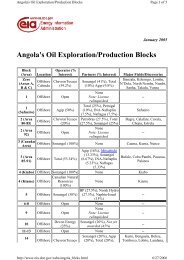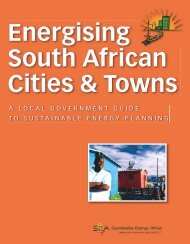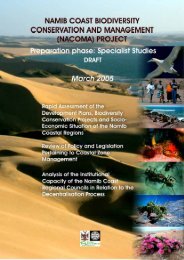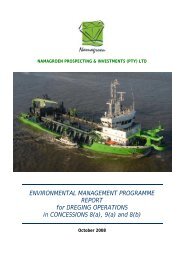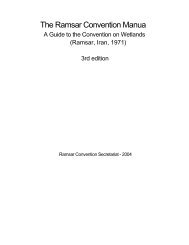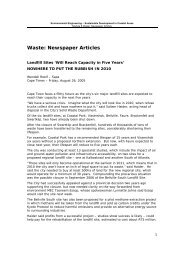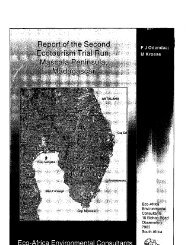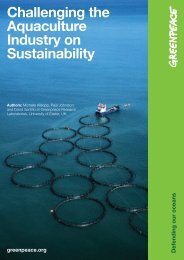Feasibility Study of Proposed Tourism Dev in Shewula, NE ...
Feasibility Study of Proposed Tourism Dev in Shewula, NE ...
Feasibility Study of Proposed Tourism Dev in Shewula, NE ...
Create successful ePaper yourself
Turn your PDF publications into a flip-book with our unique Google optimized e-Paper software.
Those not based on membership, whose functions are the concern <strong>of</strong> the general<br />
community<br />
• The water committee;<br />
• The road ma<strong>in</strong>tenance committee; and<br />
• The development committee.<br />
• The rural health motivators<br />
Membership-based groups<br />
• The Maize Farmers' Association<br />
• The Cotton Farmers' Association<br />
• Beekeepers<br />
• Permaculture <strong>in</strong>terest groups<br />
• Fish breeders<br />
• Cattle Farmers' Association (not recognised at the time <strong>of</strong> the study, but was <strong>in</strong><br />
the process <strong>of</strong> be<strong>in</strong>g f<strong>in</strong>alised)<br />
2.4.4.2. Livelihood characteristics and sources <strong>of</strong> <strong>in</strong>come<br />
The <strong>Shewula</strong> community is characterised by a high rate <strong>of</strong> unemployment, and an<br />
exchange economy that <strong>in</strong>cludes, but is not limited to, cash. There is a lack <strong>of</strong> a<br />
reliable and steady cash flow for most households, with the general population liv<strong>in</strong>g<br />
a subsistence existence.<br />
The primary crops grown <strong>in</strong> the <strong>Shewula</strong> area are maize and cotton, although some<br />
members also grow other crops, such as groundnuts, and various types <strong>of</strong> fruit and<br />
vegetables. Maize is grown ma<strong>in</strong>ly for food and the manufacture <strong>of</strong> traditional brew,<br />
although those with a surplus do store and/or sell some <strong>of</strong> their produce. Cotton is<br />
the primary cash crop, and the Cotton Farmers Association handles the sale <strong>of</strong> the<br />
produce to cotton buyers at Maphiveni.<br />
There are some community members who are experiment<strong>in</strong>g with other crops, such<br />
as bananas and p<strong>in</strong>eapples, which they then sell to local customers from the<br />
community who can afford to buy the produce. Groundnuts are another such crop.<br />
Aside from these subsistence and commercial agricultural activities, there are a<br />
number <strong>of</strong> other means whereby members <strong>of</strong> the <strong>Shewula</strong> community earn their<br />
livelihoods. Some residents have employment outside <strong>of</strong> <strong>Shewula</strong> (<strong>in</strong> centres such as<br />
Mbabane, Manz<strong>in</strong>i and Siteki) as well as further afield (such as <strong>in</strong> RSA, and<br />
especially on the m<strong>in</strong>es). Some rema<strong>in</strong> <strong>in</strong> <strong>Shewula</strong> or obta<strong>in</strong> part-time and/or<br />
seasonal employment with the local sugar companies (this is especially the case<br />
dur<strong>in</strong>g the harvest<strong>in</strong>g season).<br />
Others supplement their livelihoods by produc<strong>in</strong>g products for sale either with<strong>in</strong> the<br />
community or to outside buyers. Some <strong>of</strong> these alternative <strong>in</strong>come sources <strong>in</strong>clude:<br />
• Traditional beer, which is brewed and sold for approximately R1,40/litre.<br />
• Natural resources that are harvested and sold, <strong>in</strong>clud<strong>in</strong>g firewood, grass,<br />
herbs and wild fruit. Wild guavas, for example, are sold at a cost price <strong>of</strong> 5c<br />
each, while a 25-litre conta<strong>in</strong>er <strong>of</strong> boganu brew sells for R50.<br />
• Some <strong>of</strong> the women <strong>in</strong> the community produce handicrafts that they then sell,<br />
such as grass or reed mats and woven baskets. At the moment, the primary<br />
market for these goods is Maphiveni, with some customers com<strong>in</strong>g from<br />
Vuvulani to buy products <strong>in</strong> <strong>Shewula</strong>. <strong>Shewula</strong> community members also<br />
occasionally purchase such items.



